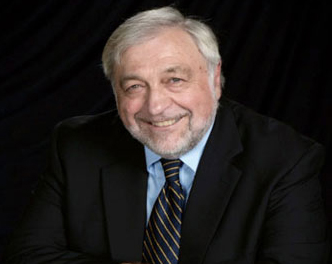MBL's Jerry Melillo, Leader in Ecosystems Research and Climate Assessment, is Elected to National Academy of Sciences

Contact: Diana Kenney, Marine Biological Laboratory dkenney@mbl.edu; 508-289-7139
WOODS HOLE, Mass.—Jerry M. Melillo, Distinguished Scientist and Director Emeritus at the Ecosystems Center of the Marine Biological Laboratory (MBL), has been elected to the National Academy of Sciences (NAS), the Academy announced this week. Election to the Academy recognizes distinguished and continuing achievements in original research, and is widely considered a mark of excellence in science. It is one of the highest honors a scientist can attain.
 MBL Distinguished Scientist Jerry M. Melillo has been elected to the National Academy of Sciences. Melillo was a lead author in the earliest reports of the Intergovernmental Panel on Climate Change, whose work was recognized by the Nobel Peace Prize in 2007. He is currently chairman of the federal advisory committee that prepared the Third National Climate Assessment for release this spring.
MBL Distinguished Scientist Jerry M. Melillo has been elected to the National Academy of Sciences. Melillo was a lead author in the earliest reports of the Intergovernmental Panel on Climate Change, whose work was recognized by the Nobel Peace Prize in 2007. He is currently chairman of the federal advisory committee that prepared the Third National Climate Assessment for release this spring.Melillo, who is also a professor at Brown University through the Brown-MBL Partnership, was one of 84 new members and 21 foreign associates of the NAS to be announced this week. Thirteen other MBL-affiliated scientists, listed below, were also elected to the Academy this week, including Timothy Mitchison of Harvard Medical School, a visiting investigator and chair of the MBL’s Science Council. In addition, four University of Chicago faculty members were elected to the Academy this week.
"I am thrilled that Jerry's groundbreaking work, along with his significant national service, has been recognized by his election to the National Academy," said MBL President and Director Joan Ruderman. "For more than four decades, Jerry and his team have been leading the way in understanding earth systems, and bringing the best scientific information available to national and international policy makers as they seek ways to enable our society to adapt to a changing climate."
A member of the MBL’s scientific staff since 1976, Melillo has conducted pioneering research on the impacts of human activities on the biogeochemistry of terrestrial ecosystems from local to global scales, using a combination of field studies and simulation modeling. He has studied carbon and nitrogen cycling in ecosystems across the globe, including arctic scrublands in northern Sweden, temperate forests in North America, and tropical forests and pastures in the Amazon Basin of Brazil.
The Terrestrial Ecosystems Model (TEM) that Melillo and colleagues developed in the mid-1980s, which was designed to consider how warmer temperatures and changes in precipitation would affect the function of land ecosystems, was the first model of land ecosystem dynamics that was global in scale and projected out for centuries. He has published more than 250 peer-reviewed articles, two ecology textbooks, and three edited volumes on biogeochemistry.
Mellilo has also dedicated decades of service to providing a scientific foundation for environmental policy. In 1990 and 1995, Melillo was a lead author in the earliest climate assessments prepared by the Intergovernmental Panel on Climate Change (IPCC), and as an author he was a co-recipient of the 2007 Nobel Peace Prize awarded to the IPCC and Al Gore, Jr. In 1996 and 1997, Melillo served as Associate Director for Environment in the U.S. President’s Office of Science and Technology Policy. He is currently chairman of the federal advisory committee that prepared the Third U.S. National Climate Assessment, to be released this spring. He also co-led the first two National Climate Assessments for the U.S. Global Change Research Program (published in 2000 and 2009).
The scientists elected to the National Academy this week bring the total number of active members to 2,214 and the total number of foreign associates to 444. Foreign associates are nonvoting members of the Academy, with citizenship outside the United States.
“I also extend my congratulations to all the new Academy members who are or have been MBL faculty members, visiting investigators, or students in the MBL courses, as well as those who are faculty at the University of Chicago,” Ruderman said. The MBL affiliates who are new National Academy of Sciences members are:
Larry Abbott, Columbia University (faculty, Methods in Computational Neuroscience; former faculty, Neural Systems and Behavior)
Carolina Barillas-Mury, National Institute of Allergy and Infectious Diseases, National Institutes of Health (former faculty, Biology of Parasitism)
Bruce P. Bean, Harvard Medical School (faculty, Methods in Computational Neuroscience)
Emery N. Brown, Massachusetts General Hospital (alumnus, Methods in Computational Neuroscience; former course director, Neuroinformatics)
Benjamin F. Cravatt, The Scripps Research Institute (alumnus, Neurobiology)
Robert B. Darnell, HHMI/Rockefeller University (former course director/faculty, Pathogenesis of Neuroimmunologic Disease; former faculty, Neurobiology)
Benjamin D. Hall, University of Washington (former faculty, Physiology)
Richard M. Harland, University of California, Berkeley (faculty and former course director, Embryology)
Jeff W. Lichtman, Harvard University (faculty and former course director, Neurobiology; former visiting investigator)
Martin M. Matzuk, Baylor College of Medicine (former faculty, Frontiers in Reproduction)
Margaret McFall-Ngai, University of Wisconsin, Madison (former faculty, Microbiology, Embryology, and Microbial Diversity)
Timothy J. Mitchison, Harvard Medical School (chair, MBL Science Council; visiting investigator; former course director, Physiology)
Andrew W. Murray, Harvard University (alumnus, Embryology; faculty, Physiology)
The University of Chicago faculty members elected to the National Academy of Sciences this week are:
Jeffrey Harvey, the Enrico Fermi Distinguished Service Professor in Physics
Carlos Kenig, the Louis Block Distinguished Service Professor in Mathematics
Lucia Rothman-Denes, professor in molecular genetics and cell biology
Dam Thanh Son, University Professor in Physics
—###—
The Marine Biological Laboratory (MBL) is dedicated to scientific discovery and improving the human condition through research and education in biology, biomedicine, and environmental science. Founded in Woods Hole, Massachusetts, in 1888, the MBL is a private, nonprofit institution and an affiliate of the University of Chicago.